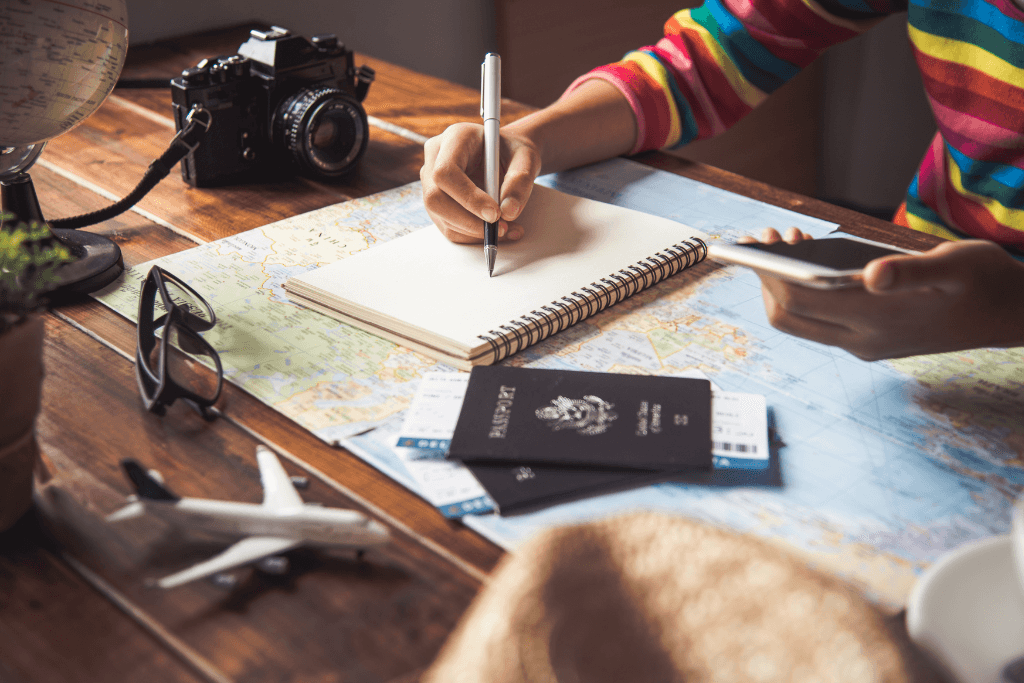Traveling internationally with your family requires thorough document preparation to prevent unnecessary hassles and emergencies, which can dampen your trip or incur unwanted surprises.
Read on to learn what essential documents your family will need, what legal requirements to consider, and where to keep copies of critical documents.
Key Takeaways
Essential documents for international travel include passports, visas, driver's licenses, insurance policies, medical and financial information, and emergency contacts.
Keep digital copies of critical documents when traveling, in case of loss or theft.
Essential Travel Documents for International Trips

Passports
Passports are the most important legal travel documents, and everyone in your family, regardless of age, must have one (with some exceptions for children for travel to Mexico or Canada). Check the passport expiration date before booking your trip, as many countries require a validity period of at least six months beyond your intended return date.
If the passport is set to expire before that period, you must start the renewal process as soon as possible. Check the U.S. Department of State's website for current passport processing times.
Visa Requirements
Depending on where you plan to visit, you may need to apply for a visa through the embassy or consulate website. Familiarize yourself with visa rules and ensure you have one, or you may be detained at immigration.
International Driving Permits
Planning on driving abroad?
Some countries require visitors to apply for an International Driving Permit (IDP), translating your U.S. driver’s license into multiple languages. This license can be acquired through organizations like the American Automobile Association (AAA) and is valid in 150 countries worldwide.
According to AAA, the cost per permit is $20 and is valid for one year. If you're planning on driving in another country, carry your IDP and regular driver’s license while traveling.
Travel Insurance Documents
Travel insurance ensures your family is covered for medical emergencies, lost items, and trip cancellations abroad. It can be a lifeline during family emergencies. Keep a copy of your policy and review it to understand coverage and procedures for claims.
Store your essential travel documents with Trustworthy. Trustworthy’s Family Operating System® is designed for family-specific needs. Trustworthy's world-class security measures, robust infrastructure, and guided workflows make storing and accessing documents, such as travel insurance policies, simple and stress-free.
Health-Related Documentation
Medical emergencies can happen anytime, so it’s essential to have your family’s health-related information readily available.
Carry necessary medical documents, including vaccination certificates required by your destination country. Without them, you may be denied entry. Check requirements on consular or embassy websites and consult your doctor about mandatory vaccinations or health concerns.
Include a summary of your family’s medical history, especially for chronic conditions or severe allergies. Also, list all prescribed medications with proper labels. These documents are vital in case of a medical emergency.
Secure your medical details with Trustworthy and share key documents with your family using its collaboration features. For non-collaborators, like doctors or medical personnel, you can use the SecureLinks™ feature to provide controlled access. SecureLinks™ lets you track who has access and for how long, ensuring complete control over your documents.
If your medication includes controlled substances, some airports will require a doctor’s note.
Family-Specific Documentation

Traveling with minors comes with additional paperwork. If a minor travels without parents or guardians, a consent letter signed by the non-traveling parent is crucial.
When traveling with a minor, carry proof of your relationship, such as birth certificates, for immigration or emergencies. Blended or non-traditional families should also have legal documents clarifying guardianship or custody. Consult a travel specialist for guidance.
Financial Documents
For backup, you can store your credit and debit card information in Trustworthy when traveling abroad, along with your bank's emergency contact numbers.
Trustworthy provides seamless access to important documents from any device, no matter where you happen to be. This flexibility is especially valuable for those who travel often or work remotely, ensuring that critical files are always readily available.
To stick to your budget while traveling, use travel budget apps to track spending easily. Create and share a budget through Trustworthy to keep your travel companion(s) on the same page.
Documents for Traveling With Pets
Traveling with your furry friend? You may need a pet passport according to the country’s requirements. Ensure all vaccinations, such as rabies, are up to date. Chat with your veterinarian about any concerns you might have.
Research your destination's pet quarantine laws and whether you need permits or health certificates. Also, check with the airline about their policies on traveling with pets.
Transportation and Accommodation Documents
Ensure your traveling experience is smooth by keeping all transportation and accommodation documents together.
Keep printed or digital copies of airline tickets and boarding passes with you at all times. Many airlines offer apps for easy access. Also, you can save digital copies of hotel bookings, transport passes, rental car agreements, and documents like insurance policies for quick reference.
With Trustworthy, you can store these essential family travel papers in one convenient location. The AI-powered Autopilot feature offers tools like filename and file storage location suggestions for quick uploading. The document summaries and search function make it simple to find information quickly when you need it.

Emergency Contact Information
Part of preparing for an emergency abroad is ensuring your contact information is readily available. Essential emergency contact information includes:
Important phone numbers: family contacts, hospitals, and local embassies.
Emergency meeting points: in case family members get separated.
Language phrases: a card with emergency phrases translated into the local language.
Customs and Legal Requirements to Consider
Legal preparedness means understanding customs and legal requirements for crossing borders.
Declare high-value items like laptops, cameras, large sums of money, and certain goods like food, alcohol, or souvenirs, as required by customs.
Check if your destination requires permits for equipment like drones. Failure to comply could result in confiscation.
Tech and Communication Readiness
Purchase a local SIM card at the airport or use a dual travel SIM to avoid roaming charges. A travel Wi-Fi device is useful for navigation apps and digital wallets.
Protect your data by enabling two-factor authentication, strong passwords, and VPNs on public networks. Trustworthy ensures security with AES 256-bit encryption, biometric authentication, and multi-factor authentication. Trustworthy's advanced threat detection uses behavior analytics to monitor for anomalies and alerts you to suspicious account activity.
What to Leave at Home
Seth Persily, attorney and founder of Elite Litigators, advises:
“I recommend leaving behind sensitive and original legal documents while traveling. These include original wills, property deeds, and any important financial documents like tax records, bank account statements, or insurance policies. Instead of taking the originals, you should make copies or digital versions and store them securely.
"It's also a good idea to leave a trusted person, such as a family member, with copies in case you need them.”
Frequently Asked Questions
What should I do if my passport is lost or stolen while traveling abroad?
Report the incident immediately to your country's nearest embassy or consulate, where they will help you get an emergency travel document. Keeping a digital copy of your passport will speed up the process.
What steps should I take if my credit or debit cards are lost or stolen abroad?
As soon as you can report the incident to your bank, have the card canceled. In the meantime, you can request a replacement card or temporary digital card numbers for online transactions if your financial institution offers this.
How can I prepare for emergencies involving natural disasters or political unrest while abroad?
You can register for your trip with the U.S. Smart Traveler Enrollment Program (STEP) to receive help and alerts about safety in the country you’ll be visiting.
We’d love to hear from you! Feel free to email us with any questions, comments, or suggestions for future article topics.














